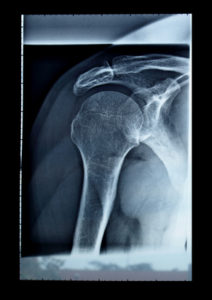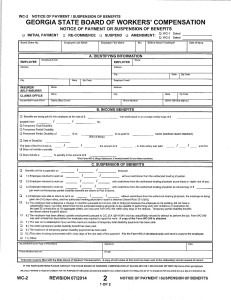People find out about permanent partial disability benefits in different ways. You may have heard about them from a doctor or an attorney. Or, you may have heard about permanent partial disability benefits from a friend who had a prior experience with workers compensation.
Regardless of how you learned about permanent partial disability benefits, you probably have many questions about what these benefits are and what they are intended to do. Some common questions people have are:
- What are permanent partial disability benefits?
- Will I get a permanent partial disability rating for my shoulder injury?
- How is my permanent partial disability rating determined?
- Will I receive a workers compensation settlement in addition to my permanent partial disability rating?
Understanding how the benefits work is extremely important to making sure you receive the workers compensation benefits you should. This article is intended to provide some general helpful information about permanent partial disability benefits generally but focuses more specifically on permanent partial disability ratings for shoulder injuries.
 What are permanent partial disability benefits?
What are permanent partial disability benefits?
Permanent partial disability benefits are often referred to as PPD benefits. PPD benefits are one of the three basic types of Georgia workers compensation benefits. The other two types of Georgia workers compensation benefits are:
- Wage loss benefits (temporary total and temporary partial disability), and
- Medical benefits
A permanent partial disability rating attempts to determine whether you have any permanent disability as a result of your injury at work. This permanent impairment is generally a loss of function. If you do not have any permanent impairment, you may not receive a PPD rating.
If you do end up receiving a PPD rating, you should receive some amount of permanent partial disability benefits at some point in the future. The exact time you will receive benefits these benefits varies because Georgia law provides that you do not receive them as long as you are receiving temporary total or temporary partial disability wages loss benefits. Since many people receive wages loss benefits for months or even years, it may be some time after you receive a PPD rating before you start receiving PPD benefits.
As I mentioned above, this article will focus specifically on permanent partial disability ratings for shoulder injuries. If you want a more complete article about PPD benefits generally, this article provides a more in depth discussion of PPD benefits.
How is my shoulder permanent partial disability rating determined?
Your workers compensation authorized treating physician usually will determine your permanent partial disability rating for your shoulder injury. Georgia law requires them to use a book published by the American Medical Association. This book is the Guides to the Evaluation of Permanent Impairment.
There are several different of the AMA Guides to the Evaluation of Permanent Impairment. In Georgia, the law requires workers compensation doctors to use the fifth edition of that book. Once your workers compensation doctor determines that you have reached maximum medical improvement, they should evaluate you for a PPD rating.
 For a shoulder injury, your workers compensation doctor should use Chapter 16 of the AMA Guides. This chapter covers injuries to the upper extremity.
For a shoulder injury, your workers compensation doctor should use Chapter 16 of the AMA Guides. This chapter covers injuries to the upper extremity.
This chapter requires your doctor to use different factors to determine your PPD rating depending on the specific type of injury you have. Some of these factors include:
- Whether you have had shoulder surgery
- If you had shoulder surgery, what type of surgery did you have
- Is your range of motion more limited than it was before your injury
- Do you have less strength in your shoulder and/or arm than you did before your injury
Certain shoulder impairments have specific defined ratings under the AMA Guides. For example, a total shoulder replacement shoulder result in a 24% upper extremity rating if it is done as an implant or a 30% upper extremity rating if done as a resection. In these examples, your strength or range of motion after the surgery may not particularly matter.
Other injuries or surgeries do not have specific PPD ratings defined under the AMA Guides. These injuries require doctors to use a combination of different measurements to determine what your shoulder PPD rating should be instead of assigning an exact rating for a particular type of injury or treatment.
Once I get a PPD rating, when will my permanent partial disability benefits start?
The primary factor determining when your PPD benefits start is whether you are still out of work as a result of your injury. If your injury continues to keep you out of work, you are probably still receiving workers compensation wage loss benefits, either temporary total disability or temporary partial disability.
Under Georgia’s law, the insurance company does not have to pay you permanent partial disability benefits while you are still receiving temporary total or temporary partial disability benefits. So, it could be some time before your PPD benefits start if you are receiving benefits because your injury keeps you out of work.
This does not necessarily mean that you need to get back to work so you can receive your shoulder PPD benefits. The number of weeks you receive PPD benefits is limited based on your rating. So, rushing back to work to receive PPD benefits will probably hurt you at some point in the future because it could worsen your injury and ultimately cause you problems in the future. You will receive those PPD benefits at some point in the future when your wage loss benefits stop.
 What happens if I get a PPD rating when I am not receiving TTD or TPD benefits?
What happens if I get a PPD rating when I am not receiving TTD or TPD benefits?
In this situation, your PPD benefits should start pretty quickly. The workers compensation insurance company has a limited time to start paying your PPD benefits once they receive your doctor’s PPD rating. If they do not start benefits on time, they should pay you a late penalty on top of the amount of the benefits that you receive.
Also, Georgia PPD law has a presumption that works in your favor when it comes to payment of benefits. The law presumes that the insurance company receives your PPD rating within 10 days of when the doctor gives the rating to you.
This means you usually do not have to prove that the insurance company actually received the PPD rating. This presumption really helps you because otherwise insurance companies could just claim that they did not receive the rating from the doctor and not start paying your benefits on time.
Can I return to work when I receive a shoulder PPD rating?
Possibly. It will likely depend on whether the permanent impairment from your shoulder allows you to return to a suitable job. This will often depend on the type of work you have done in the past and how physically demanding it is.
For example, my job as a workers compensation is not very physically demanding. I spend a good bit of my time using a computer and talking on the phone. I have a headset that I can use so I do not have to hold the phone. As long as I can do the typing I need or use a dictation software to speak out what I need to type, there are not many shoulder injuries that would interfere with my ability to return to work.
In contrast, a painter may have a very difficult time returning to work after suffering a shoulder injury that causes a permanent impairment. Limitations on the ability to use your arms overhead, move your arms repetitively up and down, and lift heavy buckets of paint might prevent a painter from going back to their regular job.
Even if you are not able to return to your regular job, one thing that often comes up after serious workers compensation injuries is the availability of suitable light duty jobs. Georgia’s workers compensation law has very specializes rules that apply to returning to light duty work. It is very important to understand those rules fully before returning to light duty work.
Does workers compensation give me a higher PPD rating if I have shoulder surgery?
Not necessarily. Sometimes, there is a specific base PPD rating assigned to certain types of shoulder surgery. In this situation, the surgery you have will factor into your PPD rating.
But, surgery is not the only factor. Other factors like range of motion and strength often factor into your PPD rating.
Surgery can certainly help improve your strength and range of motion. Because of that, many times people have a lower PPD rating after shoulder surgery than you would have before it. While this could mean you have a lower PPD rating after surgery, the good news is that lower PPD rating should also mean that your shoulder is doing much better.
Can I contest the amount of my shoulder PPD rating?
Yes, you can contest the PPD rating given to you by your workers compensation doctor. The PPD rating is the opinion of the doctor. Like anyone else, a doctor can make a mistake in giving you a rating.
Sometimes, you may actually receive two different PPD ratings from two different doctors. This often happens when your treating workers compensation doctor gives you a rating, and then the insurance company sends you to another doctor for an evaluation to get a different opinion on the PPD rating.
When this happens, the insurance company may try to pay you the lower PPD rating because it costs them less money. But, there is a good chance that lower PPD rating may not be correct.
To get a higher PPD rating paid, it is very likely that you would have to go to court and get a judge to decide that a higher rating is appropriate. To succeed in this, you will need additional evidence in the form of an opinion from another doctor (or more than one other doctor) showing a higher PPD than the insurance company is paying.
Any time you go to court about your case, you have to follow certain rules to get your evidence presented to the judge. If your evidence is not presented correctly, you will lose your case. I would recommend that you strongly consider hiring a workers compensation attorney before going to court.
Are there time deadlines for getting PPD benefits paid?
Yes. Georgia’s workers compensation law has many different time limits called statutes of limitations. These deadlines can prevent you from receiving the workers compensation benefits you should have received just because it has been too long. This is not really fair.
There is a statute of limitations that specifically applies to permanent partial disability benefits. That part of the law indicates that you have to request permanent partial disability benefits within four years of the last payment of temporary total disability benefits or temporary partial disability benefits.
This law can really hurt you if you are not familiar with it or do not understand it well. In some situations, people who did not have an attorney have received tens of thousands of dollars less in PPD benefits than they should have because they did not know that their doctor gave them the wrong PPD rating or did not know they should receive a PPD rating at all.
What if I want to settle my shoulder injury case?
PPD benefits are not the same as a workers compensation settlement. A workers compensation settlement is an agreement with the insurance company for them to pay you a certain amount of money and you to give up your case in exchange.
When you receive a PPD rating, it can often be a good time to consider settlement. Settlement can help you be done with workers compensation and put your injury behind you. For many people, this is a good thing. But, you need to make sure you fully understand settlements or have an attorney representing you who does.
Many people have misunderstandings about what settlements are and how they work. Here is an article I wrote about Georgia workers compensation settlements that should provide you with some helpful information.
You have to make sure that you make the right decision and do not settle your case for too little. Settlement is final which means you can almost never change it once your settlement have been approved. Be sure to talk to me or another workers compensation attorney before you settle your case.










